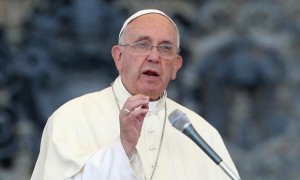On care of our common home. Pope Francis on climate change
Energy 29 June 2015Great expectations for Pope’s Francis last Enciclycal on the environment.
Differently from previous Encyclicals, the Pope addresses his message to every person who inhabits the planet, not only to the world’s 1.2 billion Catholics, asking to be conscious of the urge to adopt “environmentally friendly” life style, to work together to protect “our common home” and to abandon the “throwaway culture” dominating modern life. Pope Francis sent his encyclical (translated in five languages) to all 5,000 bishops around the world. The Encyclical focuses on the climate change, as one of the “principal challenges” of our times as result of short-sighted economical and commercial policies, that have exploited Earth’s natural resources until they are “squeezed dry beyond every limit”.
Sovereign countries are increasingly interdependent, given the worldwide dimension of the economic and financial system. As the Pope states “We are one single human family” and “there are no frontiers or barriers, political or social, behind which we can hide, still less is there room for the globalisation of indifference.”
The XXI century trend demands, therefore, international institutions to represent shared and common interests, beyond national’s courtyards. Thus, after the consumerism, Pope Francis encourages a simple and sober life, with no waste.
Of course, the Encyclical’s approach is social. The reason behind is the defense of those who cannot do it by themselves, namely next generations, but also rural countries that experience the counter-effects of the climate change, without benefiting from any economic advantages. Indeed, Pope Francis, who is known for his stance against global poverty after growing up in an unequal Buenos Aires, focused his message on the impact on developing countries. He referred to African countries, devastated by growing temperatures and the drought, mainly caused by the “huge consumption” of richer nations.
“The foreign debt of poor countries has become a way of controlling them, yet this is not the case where ecological debt is concerned.” “In different ways, developing countries, where the most important reserves of the biosphere are found, continue to fuel the development of richer countries at the cost of their own present and future.”
“If present trends continue, this century may well witness extraordinary climate change and an unprecedented destruction of ecosystems, with serious consequences for all of us.” The Pontiff stabs at an economy based on fossil fuels, alongside deforestation. He shares the common “green” view of stringent policies to restrict greenhouse gas emissions and a greater use of renewable energy. “What kind of world do we want to leave to those who come after us, to children who are now growing up?” he asks. “Never have we so hurt and mistreated our common home as we have in the last two hundred years… it is remarkable how weak international political responses have been.” And definitely, apart from the social issue, the Encyclical is a political denounce against the weakness of the international politics. “The failure of global summits on the environment makes it plain that our politics is subject to technology and finance.” The impact of the document is expected to be significant for the European and international’s energy sector. As recent history has taught us, “regrettably, many efforts to seek concrete solutions to the environmental crisis have proved ineffective, not only because of powerful opposition but also because of a more general lack of interest.” International politics is weak in face of the economic and financial interests.
The timing of the Encyclical is not casual. On the verge of the Paris Declaration in December, the Argentinian Pontiff denounces the weakness of the international political reaction to a system that is not able to protect the common goods. Pope Francis is a game-changer in the debate over the global warming causes and the solutions to reverse it.
It is not surprising that some politicians have not appreciated his intervention on climate change; for instance, the US presidential candidate Jeb Bush on the eve of the release claimed: “I don’t get economic policy from my bishops or my cardinal or my Pope,” underlining the strong opposition in the United States to a binding global agreement aimed at curbing greenhouse gases.
Nonetheless, the Pope is putting pressure for far-reaching measures to be agreed in Paris, when more than 200 countries will gather for a climate summit aimed at clinching a global accord on carbon emissions.
The document also makes a reference to young people, saying that their hopes for a better future could be thrown into doubt by climate change and poverty, due to the “degradation” that “our Sister Mother Earth” is suffering and that must be stopped.
In his message, Pope Francis asks for a “bold cultural revolution” to correct the “structurally-perverse” economic system of the rich exploiting the poor that is turning the planet into an “immense pile of filth”. The Argentinian Pontiff ended on a positive note, asserting that all is not lost and that humans, “while capable of the worst, are also capable of rising above themselves, choosing again what is good, and making a new start”.



